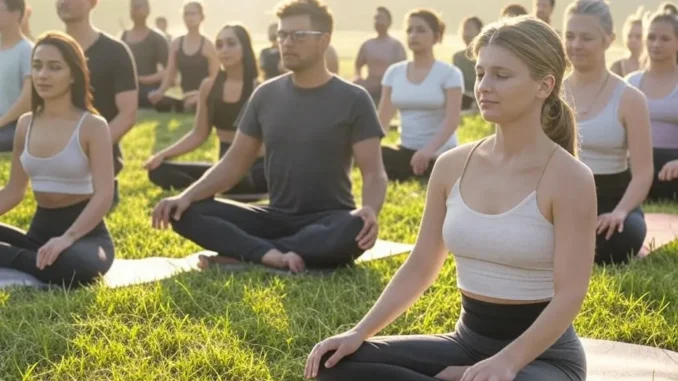
Introduction
In today’s fast-paced world, achieving balance between mind and body is more crucial than ever. Yoga and meditation have long been celebrated for their transformative benefits, promoting overall health and well-being. These ancient practices not only improve physical strength and flexibility but also help manage stress and foster mental clarity. This blog post will explore 7 powerful ways in which yoga and meditation can enhance your physical and mental well-being, providing practical tips for beginners and seasoned practitioners alike.
1. Enhances Flexibility and Strength
One of the most apparent benefits of yoga and meditation is the improvement in physical flexibility and strength. Regular yoga practice gently stretches and tones muscles, increases range of motion, and helps prevent injuries. Over time, you may notice improved posture and reduced muscle stiffness.
Practical Tip:
Start with beginner-friendly poses like Child’s Pose and Cat-Cow to gradually build your flexibility. As you progress, incorporate more challenging postures such as Warrior II and Downward-Facing Dog.
2. Reduces Stress and Anxiety
Stress is a significant contributor to many modern health issues. Yoga and meditation are renowned for their ability to lower stress levels by calming the mind and releasing tension from the body. Meditation techniques, such as deep breathing and mindfulness, help reduce cortisol levels, leading to a calmer state of mind.
Practical Tip:
Dedicate 10-15 minutes each day to a mindfulness meditation session. You can also try guided meditation apps to help ease your transition into a relaxed state.
3. Improves Mental Clarity and Focus
A consistent practice of yoga and meditation can lead to better concentration and mental clarity. By encouraging mindfulness, these practices help you remain present in the moment, which can enhance your decision-making and problem-solving skills.
Practical Tip:
Incorporate short meditation breaks during your workday. Even a five-minute session can reset your mind and improve focus.
4. Boosts Energy Levels and Mood
Engaging in yoga and meditation can naturally boost your energy levels and elevate your mood. The physical activity involved in yoga increases blood flow, while meditation promotes the release of endorphins—the body’s natural “feel-good” hormones.
Practical Tip:
Try starting your day with a morning yoga session to energize your body and mind. Pair it with a few minutes of meditation to set a positive tone for the day ahead.
5. Enhances Sleep Quality
Poor sleep can be a major barrier to overall health. Yoga and meditation can improve sleep quality by promoting relaxation and reducing insomnia symptoms. The calming effects of these practices help prepare your body for a restful night’s sleep.
Practical Tip:
Incorporate a gentle yoga routine or a calming meditation session before bedtime. Focus on deep breathing and relaxation techniques to help you wind down.
6. Supports Emotional Balance and Resilience
Emotional well-being is just as important as physical health. Yoga and meditation provide tools for self-awareness and emotional regulation, allowing you to better manage negative emotions and build resilience in the face of life’s challenges.
Practical Tip:
Consider journaling after your meditation sessions. Reflecting on your thoughts can help you understand your emotions and foster a more balanced outlook on life.
7. Fosters a Sense of Community and Connection
Many people find that practicing yoga and meditation in a group setting enhances their experience. Being part of a community not only provides motivation and accountability but also creates a supportive environment where you can share your progress and challenges.
Practical Tip:
Join a local yoga class or an online meditation group to connect with like-minded individuals. The shared experience can be incredibly uplifting and motivating.
FAQs About Yoga and Meditation
Q1: Why are yoga and meditation important for overall well-being?
A: They are powerful practices that enhance physical flexibility, reduce stress, improve mental clarity, and support emotional balance, leading to a more harmonious life.
Q2: What type of yoga is best for beginners?
A: Hatha and Vinyasa yoga are excellent for beginners as they focus on basic postures, breathing techniques, and can be modified to suit various fitness levels.
Q3: How can I integrate meditation into a busy schedule?
A: Start with short sessions of 5-10 minutes in the morning or during a break. Gradually increase the duration as you become more comfortable with the practice.
Q4: When will I notice the benefits of yoga and meditation?
A: Some benefits, such as improved mood and reduced stress, can be noticed within a few sessions. More significant changes in flexibility, strength, and mental clarity typically develop over several weeks of consistent practice.
Internal & External Links for SEO
- Internal Link:
For additional wellness tips, check out our guide on healthy-lifestyle-habits. - External Link:
For expert advice on yoga practices, visit Yoga Journal.
Conclusion
The transformative power of yoga and meditation extends far beyond the mat. These practices offer a holistic approach to enhancing both physical and mental well-being, from boosting flexibility and strength to reducing stress and fostering emotional balance. By integrating these practices into your daily routine, you can achieve a state of equilibrium that benefits every aspect of your life. Embrace the journey of self-improvement, and start reaping the benefits of yoga and meditation today.
Leave a Reply